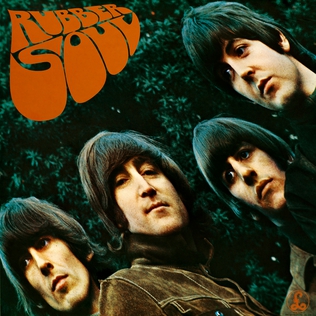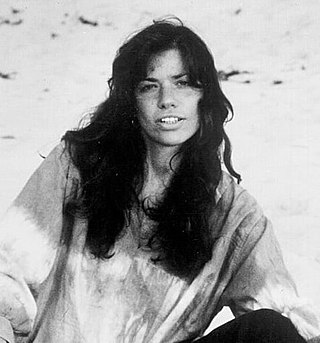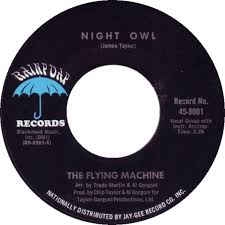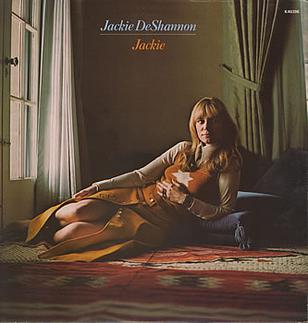
Rubber Soul is the sixth studio album by the English rock band the Beatles. It was released on 3 December 1965 in the United Kingdom, on EMI's Parlophone label, accompanied by the non-album double A-side single "Day Tripper" / "We Can Work It Out". The original North American release, issued by Capitol Records, contains ten of the fourteen songs and two tracks withheld from the band's Help! album. Rubber Soul was met with a highly favourable critical response and topped sales charts in Britain and the United States for several weeks.

Carly Elisabeth Simon is an American musician, singer, songwriter, memoirist, and children's author. She rose to fame in the 1970s with a string of hit records; her 13 Top 40 U.S. hits include "Anticipation" (No. 13), "The Right Thing to Do" (No. 17), "Haven't Got Time for the Pain" (No. 14), "You Belong to Me" (No. 6), "Coming Around Again" (No. 18), and her four Gold-certified singles "You're So Vain" (No. 1), "Mockingbird", "Nobody Does It Better" (No. 2) from the 1977 James Bond film The Spy Who Loved Me, and "Jesse" (No. 11). She has authored two memoirs and five children's books.

Too Fast for Love is the debut studio album by American heavy metal band Mötley Crüe. The first edition of 900 copies was released on November 10, 1981, on the band's original label Leathür Records. Elektra Records signed the band the following year, at which point the album was remixed and partially re-recorded. This re-release, with a different track listing and slightly different artwork, has become the standard version from which all later reissues derive. The re-recorded album also removed the song "Stick to Your Guns", though it is featured on a bonus track version of the album. The original mix of the album remained unreleased on CD until 2002, when it was included in the Music to Crash Your Car To: Vol. 1 box set compilation.

"Ticket to Ride" is a song by the English rock band the Beatles, written primarily by John Lennon and credited to Lennon–McCartney. Issued as a single in April 1965, it became the Beatles' seventh consecutive number 1 hit in the United Kingdom and their third consecutive number 1 hit in the United States, and similarly topped national charts in Canada, Australia and Ireland. The song was included on their 1965 album Help! Recorded at EMI Studios in London in February that year, the track marked a progression in the Beatles' work through the incorporation of drone and harder-sounding instrumentation relative to their previous releases. Among music critics, Ian MacDonald describes the song as "psychologically deeper than anything the Beatles had recorded before" and "extraordinary for its time".

Anticipation is the second studio album by American singer-songwriter Carly Simon, released by Elektra Records, in November 1971.

"The Back Seat of My Car" is a song written by Paul McCartney, released as the closing track of his and his wife Linda's 1971 album, Ram. Several months later, it was released as a single in the UK, peaking at number 39. The song modulates stylistically between a sweeping piano-and-orchestra ballad similar to McCartney's "The Long and Winding Road" and upbeat rock sections before ending in a raucous and passionate finale.

"Anticipation" is a song written and performed by Carly Simon, and the lead single from her 1971 album of the same name. The song peaked at No. 13 on the Billboard pop singles chart and at No. 3 on the Billboard Adult Contemporary chart. The song also ranked No. 72 on Billboard's Year-End Hot 100 singles of 1972, while the Anticipation album garnered Simon a Grammy Award nomination for Best Pop Female Vocalist. Simon wrote the song on the guitar in 15 minutes, as she awaited Cat Stevens to pick her up for a date.

"Runnin' Blue" is a song written by guitarist Robby Krieger and performed by the Doors. Elektra Records released it in August 1969 as the fourth single from the band's fourth album The Soft Parade, backed with "Do It". The single peaked at No. 64 on the Billboard Hot 100 chart and at No. 40 on the Cash Box Top 100 chart.

"Your Smiling Face" is a hit single by singer James Taylor. First available on the album JT, and released as the album's sophomore single in September 1977, "Your Smiling Face" peaked at number 11 in Cash Box magazine and at 20 on the Billboard Hot 100 near year's end. It reached number 11 on the RPM Top Singles chart in Canada. On Billboard's Adult Contemporary chart, it reached number 6.

Songs for a Tailor is the 1969 debut solo album by the Scottish musician, composer and singer Jack Bruce, who was already famous at the time of its release for his work with the supergroup Cream. Originally released on the Polydor label in Europe and on Atco Records in the U.S., Songs for a Tailor was the second solo album that Bruce recorded, though he did not release the first, Things We Like, for another year.

"Love Stinks" is a song written by Peter Wolf and Seth Justman that was the title track of the J. Geils Band's 1980 album Love Stinks. The song was released as a single and peaked in the US at #38, spending three weeks in the Top 40. In Canada, the song reached number 15, as it did on WLS-AM in Chicago.
"Funtime" is a song written by Iggy Pop and David Bowie, first released by Iggy Pop on his 1977 album entitled The Idiot. It reflects Iggy and Bowie's growing fascination with the German music scene, and bears marked similarities to "Lila Engel" by krautrock band Neu!. It has since been covered by multiple artists including Blondie, Boy George, Bebe Buell, Peter Murphy, R.E.M. and The Cars.

"The Right Thing to Do" is a song written and performed by Carly Simon that first appeared on her 1972 album No Secrets. The song was recorded at Trident Studios in London's Soho. It was released as the second single to the album, following "You're So Vain" and reached No. 17 on the Billboard Hot 100 and No. 4 on Billboard's Adult Contemporary chart. It also reached No. 20 on the Canada Top Singles chart and No. 9 on the Canadian Adult Contemporary chart. It reached No. 17 in the UK.

"You Can Close Your Eyes" is a song written by James Taylor which was released on his 1971 album Mud Slide Slim and the Blue Horizon. It was also released as the B-side to his #1 single "You've Got a Friend". It has often been described as a lullaby. It was initially recorded by his sister Kate Taylor for her 1971 album Sister Kate. The song has been covered by many artists, including Carly Simon, Linda Ronstadt, Maureen McGovern, Richie Havens, Sheryl Crow, Sting, Eddie Vedder with Natalie Maines, and the King's Singers.

"Haven't Got Time for the Pain" is a song written by Carly Simon and Jacob Brackman that was first released on Simon's 1974 album Hotcakes. It was also released as a single, reaching No. 14 on the Billboard Hot 100 and No. 2 on the Billboard Adult Contemporary chart.

"Night Owl" is a song written by James Taylor that was originally released as a single by Taylor's band the Flying Machine, which also included Danny Kortchmar in 1967. Taylor later rerecorded a solo version of the song for his Apple Records debut album James Taylor in 1968. Subsequently, the Flying Machine version was released on the album James Taylor and the Original Flying Machine. It has also been covered by such artists as Alex Taylor, Carly Simon and Anne Murray.
"Millworker", or "Millwork", is a song written by James Taylor. It was originally written for the Stephen Schwartz Broadway musical Working. Taylor's own recording was released on his 1979 album Flag along with "Brother Trucker", which Taylor also wrote for Working. It has also been covered by other artists, including Bette Midler, Emmylou Harris, Pearl Jam's Eddie Vedder, Bruce Springsteen, Jennifer Warnes and Francis Cabrel.

Jackie is an album by American pop singer and songwriter Jackie DeShannon, released in 1972 by Atlantic Records. It was recorded in Memphis with producers Jerry Wexler, Tom Dowd and Arif Mardin.
"Laura" is a song written by Billy Joel that was first released on his 1982 album The Nylon Curtain.
"Unknown Legend" is a song written by Neil Young that was first released on his 1992 album Harvest Moon. Although it was not released as a single, it reached #38 on the Billboard Magazine Mainstream Rock Tracks chart.
















